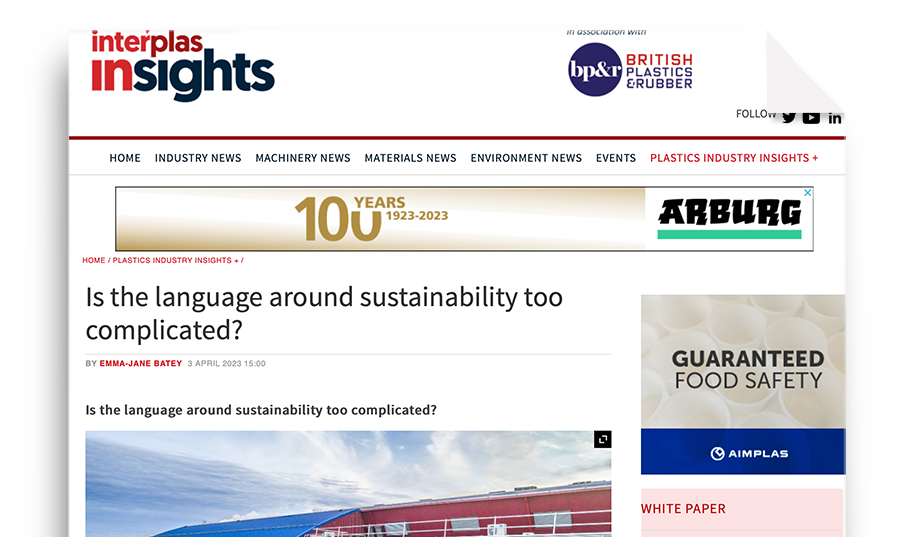
Hopefully we can all agree on one thing; a circular economy is the goal. So, to that end, we should all be trying to make sustainability as easy as possible. For long-term environmentally beneficial actions to be implemented without unnecessary delays, the people who make the decisions have to be able to understand why they should do what they have the power to do.
But what if the language around sustainability has become too complicated? For the packaging industry, even packaging experts can find it hard to explain exactly what sustainability means, and how to clearly define the targets and actions that can make a difference. It seems that agreeing on the why doesn’t translate to agreeing on the what or the how. Why is that? Surely we can invest a
little time on clarifying the core sustainability terms so that we’re on a better path towards a circular economy?
Emmanuel Duffaut, sustainability director at plastic packaging producer RETAL agrees. Now in his sixth year at the company, he has seen steady progress in the clarity of sustainability communications and how this makes it easier for stakeholders to engage. Duffaut says, “The last five years have been a huge leap forward in terms of sustainability reporting, and the understanding of sustainability in general. There are many drivers for sustainability in a global plastic packaging producer, most notably the desire to be a responsible player in this industry. There are incredible innovations coming forward that harness the R&D skills of packaging design experts for example, as well as responsible operational solutions such as using renewable electricity to
reduce GHG emissions.”
This combined approach of integrating expertise in packaging design with responsible decisions beyond the packaging products themselves equals a more holistic way of addressing sustainability. Duffaut heads the team that creates RETAL’s annual sustainability report, and it is here that a number of challenges arise in terms of language used. Duffaut explains, “Even just the fact that the terms Sustainability Report, CSR Report and ESG Report seem interchangeable can be confusing. I take a pride in making sure our Sustainability Report is as clear and easy to read as possible so that all our stakeholders – customers, suppliers, financial institutions and employees – can see our progress and get on board with making progressive decisions.”
Don’t bamboozle anyone
As with anything, it’s easy to assume that people know the jargon. Let’s be honest, some people like to bamboozle others by sneaking in acronyms and tricky terms just to confuse them or make themselves feel important. But when it comes to sustainability, shouldn’t we all be making it as accessible as possible? There is no benefit to making sustainability more complicated as we will all be further away from the goal of a circular economy.
A recent report in the Financial Times highlights how the lack of clarity around definitions in corporate sustainability is increasingly challenging, noting that large chunks of teaching time for MBA students is focused on defining sustainability terms, rather than analysing the topic itself. For corporations, the story is similar, with a report from IBMon the importance of sustainability for business noting that ‘companies may lack the ability to implement sustainable solutions or even know where to start. Sustainability in business is evolving and so are the answers.’
The IBM report adds the fact that ‘sustainability in business is a megatrend that will continue to profoundly affect companies’ competitiveness and even survival in the market’. That survival element is largely due to consumers voting with their feet because while they may not want to drastically change their habits, they do want to be more responsible. A white paper from Deloitte explains this by saying that sustainable lifestyles are on the rise, but that ‘consumers need more help’ in making decisions.
What’s the fix then? It seems like we have an excellent recipe for progressive and meaningful sustainability if businesses want to develop more sustainable solutions, financial institutions want to invest in sustainable businesses, and consumers want to spend their hard-earned money on products that share their values.
Much like the term ‘greenwashing’ helped to shed light on unproven environmental claims by giving it an easy-to-remember name, all of us involved in the positive future of the packaging can agree to stop the jargon, to choose to make sustainability simple. Duffaut is clear that companies can make this choice too, “There is a balance to be had between the necessary evolving of language around corporate sustainability progress and using new terms for their own sake. Sustainability isn’t a competition with winners and losers, we all stand to gain if we can take meaningful steps forward. For example, clearly definable terms like ‘mitigate’ and ‘material’ are useful for the clarity and brevity of reporting, but also for communicating with our stakeholders. Whereas ‘green’ or ‘eco’ don’t actually mean anything.”
Commit to clarity
Everyone is busy, everyone is on the same planet, but are we on the same page? Being clear about what reporting structure, what terminology, what
framework a business is choosing to report on its sustainability performance is an easy first step. There are plenty of respected options, including
EcoVadis, CDP, GRI and other standards are all available for structured reporting, so starting with a known quantity is helpful. Taking that a step further
and accepting that we have a human responsibility to be clear about how good packaging can be responsible, practical and progressive will also
encourage clear language to be the norm, so we can all win at sustainability.
Read online at Interplas Insights
Read / download in PDF